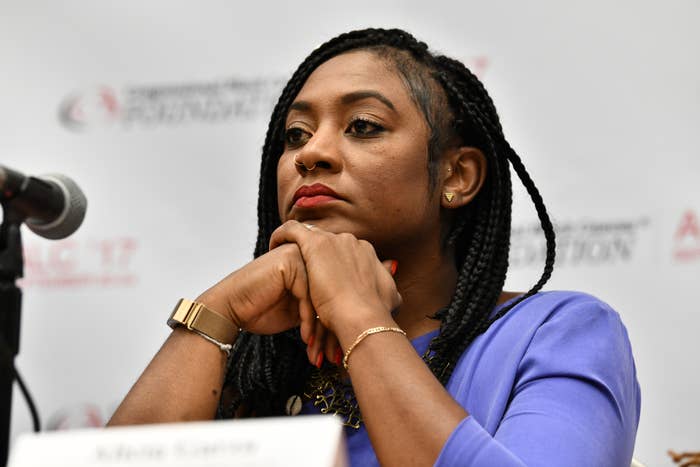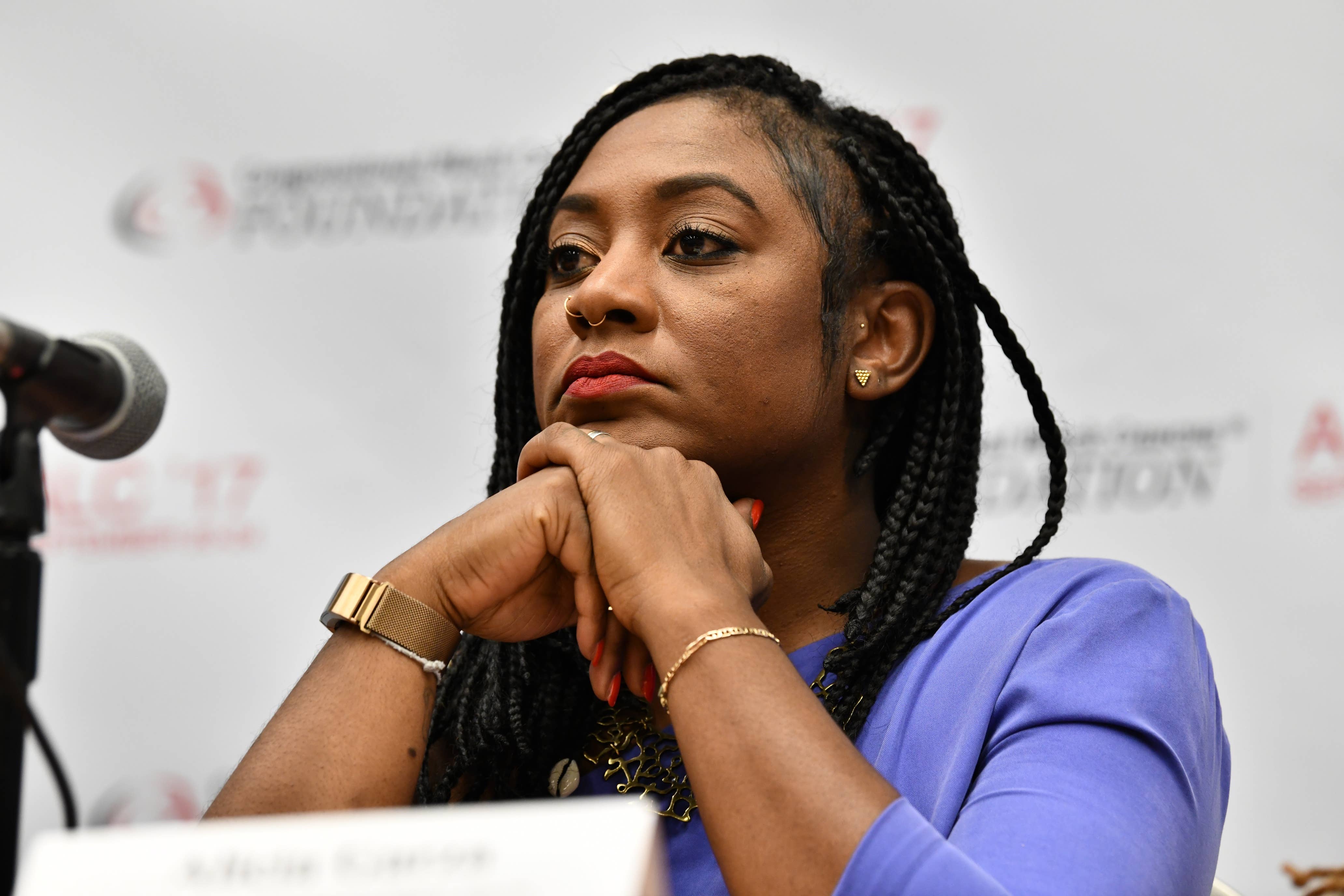
I was 15 when I first started cutting [myself].
I remember it well. I was in high school and was trying to figure out who I was. Being one of a handful of Black teenagers in a predominantly white high school and community was not easy. I rebelled against my parents, who were strict and had high expectations of me. One afternoon, all of my insecurities, rebellion, and experimentation with drugs and alcohol put me in hot water. I was with a friend in a Long’s Drug Store and decided that I wanted some Lee Press-On Nails. I, of course, didn’t have any money to buy said item but that was ok because I’d decided to steal them.
I’d told my parents that I was going to my friend’s house to study for our French exam, but really, I’d gone there to get high and sip on vodka and orange juice, and smoke cigarettes. We convinced my mother, who was usually very diligent about making sure that an adult was present, that my friend’s mom was on her way home and just got stuck in a little traffic, and that we would make sure she called my mom when she arrived at home. While we were waiting for the mother who never materialized, we walked down to the local drug store to pick up cigarettes—my friend had a fake ID.
I remember sliding the package up my sleeve. I remember heading to the checkout counter with my friend and her fake ID. I remember feeling a little buzzed from the screwdriver we’d just had and I remember looking forward to the cigarette we were going to smoke together. I remember I was less than five feet out the door when I heard someone say, “Ma’am, are you currently in possession of items you did not pay for?” I froze. I claimed that I didn’t have anything, knowing that my parents would kill me if they found out I’d stolen from a store. I even tried to claim that I was an emancipated minor, so that they wouldn’t call my parents. The store did, of course, call my parents, reminded me that if I was emancipated that I was headed straight to jail, and when my parents and my grandmother showed up to collect me, I was sitting in a chair in a back room in handcuffs.
My grandmother had just arrived that evening from Toledo, Ohio, and as strict as my parents were, my granny was even more strict and she was Southern—the kind of woman who would flick your elbows if they landed on the table. I’d embarrassed myself and my parents in front of my strict Southern grandmother.
My parents, determined to show me and Grandma that there would be serious consequences for my actions, grounded me for a year. Yes—365 days. I, being a very social being and also a hormonal one, was devastated. That devastation, the disappointment in myself and the isolation became too much, and I began to cut.
At first, it was a way to ease the pain that I felt. But soon, it became a way to tiptoe closer to the edge of what it might mean to cheat death. For almost a year, I cut my wrists and arms. Band-Aids and long sleeves helped cover my wounds, at least in public, and when I was asked what happened to my wounded arms and wrists I would respond that it was due to some manual labor that my parents had me doing as punishment for scaring them half to death.
That year, I learned a lot about myself. One, I learned that I did not, in fact, want to die. Two, I learned that there was a pit inside of me that could be dangerous for me if I wasn’t careful.
Four years ago, my two sisters and I created Black Lives Matter as a call to take action against state sanctioned violence, in response to police killings of Black people specifically and anti-Black racism generally. Since then, the three of us, alongside dozens of other leaders across the country, have become prominent figures in this movement.
I’m not a stranger to this side of the work, as I’ve been an organizer for nearly 20 years. I can say that the same kinds of dynamics exist at the local level as they do at the national level. But it doesn’t ever get easier. As much as I believe in the goodness of human beings, I’ve also seen and experienced the not so nice side of humans that we all carry inside of us—narcissism, jealousy and ego, and more. It never gets easier.
People who have never met you and have no real relationship with you attack you and say horrible, awful, terrible things about you. There are the death threats and the trolls, and then there are people who are supposedly “on your side” that use your visibility as an excuse to degrade and dehumanize you. There’s conspiracy theories, people who just can’t bring themselves to like you, threats, trolling, political disagreements, all of which are the unspoken consequences of being someone that other people know of.
When I first started organizing, I remember committing myself to this work for the long haul. I know that in order to stay in this work for the long haul, that I needed to prioritize my mental and emotional health and wellness.
Once, after a campaign that we ultimately lost, I fell into a deep depression. I’m pretty sure I didn’t leave my couch for about two weeks, crying and reading the comments under every article that was written about our loss. I was preparing to be married just a few short months after that, and I was tossed back to being 15 years old, looking for an outlet for the pain I felt.
Since then, I’ve invested in my emotional and mental health as if it is food, or water, or air. If I don’t make that investment, if I am not committed to my own wellbeing, I worry that I will find that deep place, fall in, and not be able to emerge again. And while I have compassion and empathy for the 15-year-old me, I also know that I don’t want to go back there.
That doesn’t mean that I’m ok all the time. I still get angry, I still hurt and get disappointed, especially if and when I disappoint others. Sometimes I don’t sleep enough or eat the best that I could, and I never met an alcohol that wasn’t my friend.
But health and wellness aren’t about being perfect or being ok all the time. It’s about taking care of what needs caring for, so that we can get closer to what moves in us. It’s about having an array of choices that we can access at any given moment.
A few years after that big campaign loss, I went through a program called Black Organizing for Leadership and Dignity (BOLD). BOLD is an organization that supports Black leaders to build their capacity to lead. Using a combination of methodologies that include but are not limited to somatics, African and Black American spiritual practices, political education and leadership development, I was able to access tools, skills and strategies that support me to care for my mental and emotional wellbeing.
I began to understand my learned responses to trauma, and how those learned responses impact me, my relationships, and my purpose. I’m still learning how to deploy those practices in the service of that which I care most about. I learned to cultivate compassion for the brilliant ways I learned to care for myself, and I learned that I have agency to determine how I care for myself today.
I am a commitment to a durable and resilient heart. To get closer to my commitment, I strive to practice yoga at least five times a week; to practice meditation for 10 minutes each day, and to purposefully envision solutions and freedom for ten minutes a day.
health and wellness aren’t about being perfect or being ok all the time. It’s about taking care of what needs caring for.
I practice not to be perfect, happy, or joyful, although I am grateful if and when being happy or joyful is an unintended consequence of my practice. I practice in order to feel. To look squarely at what is. I look courageously at my flaws, my sadness, my fear of disappointing people, my own disappointment because I want to have a heart that is durable and resilient. That breaks apart and can be put back together again. Both and, not either or.
I am a commitment to building a vibrant, transformative movement for Black liberation. To get closer to my commitment, I practice the things that help me have a durable and resilient heart. Because I know that building movements is hard. Hell, change is hard. I know that I will have my heart broken a million times. I know that sometimes things will be hard, that I will be hurt and I will hurt others. Being a commitment to a durable and resilient heart is a commitment to our people, in all of our complexities and messiness. It is a commitment to myself and my purpose. It is a commitment to healing so that the world that we dream of can arrive as the world that dehumanizes us gets dismantled.
My emotional and mental well being depends on my commitment to what I care for most. It depends on being resilient, which is not the same as being perfect. It depends on being durable, which is not the same as infallible. And when I move towards the things I care most about, I am the most free I have ever been. Wounds, cuts, scars and all.
It takes a brave person to recognize that his or her own life has become too much to manage alone, and an even braver person to take the steps to reach out and talk about it. Share your realness by using #BeWell and #BeHeard when you're ready. If you or someone you know needs more immediate intervention, please contact one of the following:
- Call the National Suicide Prevention Lifeline at 800-273-TALK (8255).
- Text LA to 741741 to talk with a trained Crisis Counselor for free, 24/7.
- Teens can talk with a teen listener at 310-855-4673 or Text TEEN to 839863
You can feel better and you can #BeWell.




